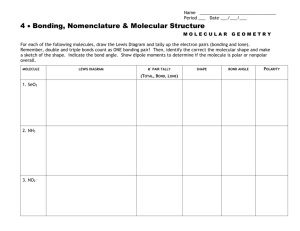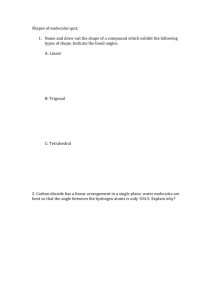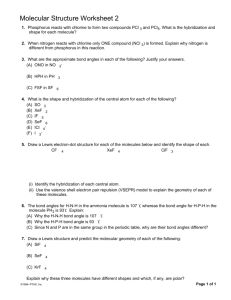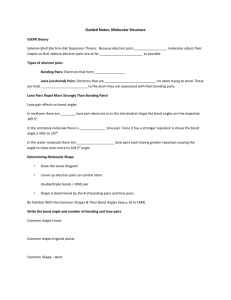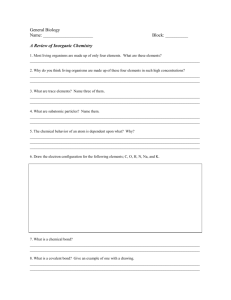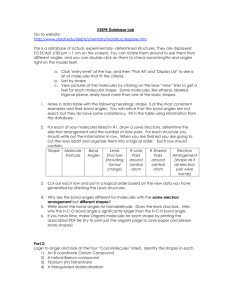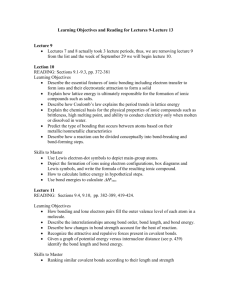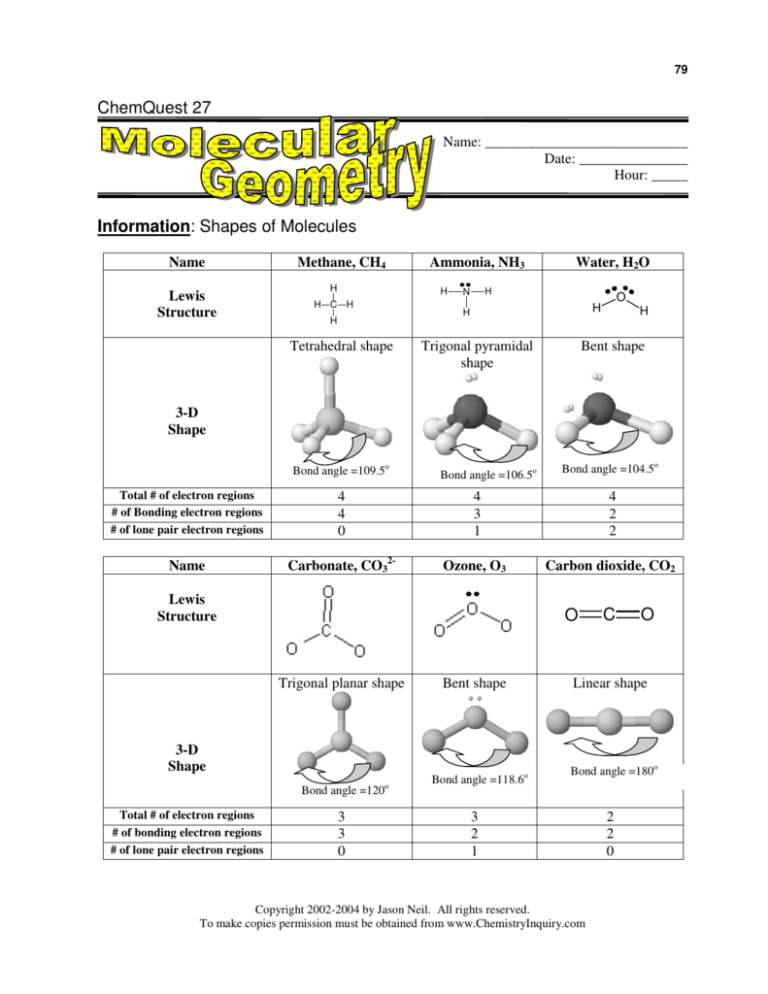
79
ChemQuest 27
Name: ____________________________
Date: _______________
Hour: _____
Information: Shapes of Molecules
Name
Lewis
Structure
Methane, CH4
H
Ammonia, NH3
H
H C H
H
Tetrahedral shape
Water, H2O
H
N
O
H
H
Trigonal pyramidal
shape
H
Bent shape
3-D
Shape
Bond angle =109.5o
Bond angle =106.5o
Bond angle =104.5o
Total # of electron regions
# of Bonding electron regions
# of lone pair electron regions
4
4
0
4
3
1
4
2
2
Name
Carbonate, CO32-
Ozone, O3
Carbon dioxide, CO2
Lewis
Structure
O
Trigonal planar shape
3-D
Shape
Bond angle =120o
Total # of electron regions
# of bonding electron regions
# of lone pair electron regions
3
3
0
Bent shape
Bond angle =118.6o
C
O
Linear shape
Bond angle =180o
3
2
1
Copyright 2002-2004 by Jason Neil. All rights reserved.
To make copies permission must be obtained from www.ChemistryInquiry.com
2
2
0
80
Critical Thinking Questions
1. What is an electron region?
2. What is a "lone pair electron region"?
3. What is a "bonding electron region"?
4. The number of electron regions determines the bond angle. With this in mind, complete the
following sentence: "Any molecule that has bond angles of approximately 105-109o will have
____________ total electron regions; any molecule that has bond angles of approximately 120o
how many?
will have ___________ total electron regions; and any molecule with bond angles of
how many?
approximately 180o will have ___________ total electron regions."
how many?
5. The molecules in the above table are representative of many other molecules. Therefore, it can be
said that any molecule with 3 bonding electron regions and 1 lone pair electron region has a
geometrical shape called "trigonal pyramidal". Draw Lewis dot structures for the following
structures and name the geometrical shape.
A) NO3B) NF3
C) CF4
6. A certain molecule has a bent shape with bond angles of about 119o. Is the molecule SO2 or SH2?
Explain. (Hint: draw the Lewis structures for SO2 and SH2.)
Information: VSEPR
The geometry of molecules is based on a theory called "Valence Shell Electron Pair Repulsion"
(VSEPR) theory. The word "repulsion" is the key word because this theory states that all the electron
pairs repel each other and so they want to get as far away from each other as possible. The atoms in a
tetrahedral molecule are as far apart as geometrically possible at bond angles of 109.5o. There is no
way that the atoms can get farther apart.
Critical Thinking Questions
7. In the tables above, there are 3 molecules that have a total of 4 electron regions. The bond angles
are slightly different because of lone pair electrons. What takes up more room--a lone pair of
electrons or a bonding pair of electrons? Offer proof from the table above.
Copyright 2002-2004 by Jason Neil. All rights reserved.
To make copies permission must be obtained from www.ChemistryInquiry.com
81
8. If you know how many bonding regions and lone pair regions surround an atom you can predict
the bond angles around the atom, even in complex situations. Examine the following "big"
molecules. By each arrow that points to an atom, write the bond angle for that atom; you should
write 109o, 120o, or 180o to represent the approximate bond angle. One of them is done for you.
120o because of 3 bonding regions
and no lone pair regions
H
H
C
H
H
H
H
H
H
C
C
C
C
H
C
C
H
N
H
C
H
H
H
H
O
H
H
C
H
H
C
C
H
H
H
H
H
H
C
H
N
C
H
H
O
H
O
C
C
C
O
N
Copyright 2002-2004 by Jason Neil. All rights reserved.
To make copies permission must be obtained from www.ChemistryInquiry.com

